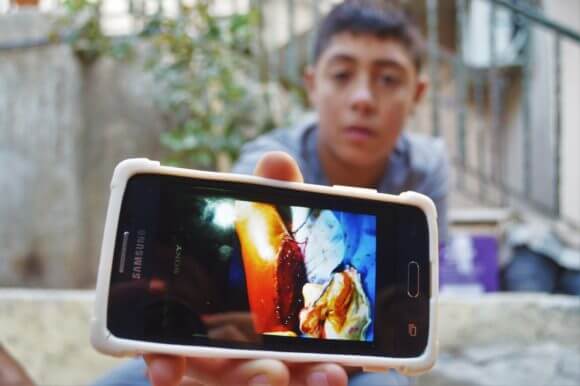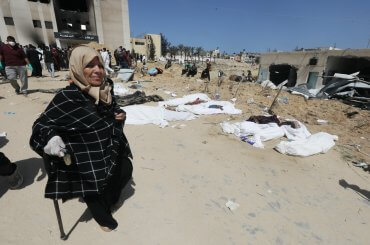In March, 12-year-old Ramzi Abu Ajamia got word that Israeli forces were looking for him. Terrified of getting arrested, Ramzi stopped sleeping at home and going to school. He succeeded in dodging Israeli forces for five months before he was spotted at clashes during an Israeli night raid on Dheisha refugee camp, where the now 13-year-old was born and raised.
It all happened within seconds, Ramzi recalled to Mondoweiss. Israeli forces spotted the boy on the streets around 1 a.m., and fired. Ramzi dropped to the ground before another young man rushed to his aid. The other young man was shot in the leg, and then two more bullets whizzed through the air, hitting Ramzi yet again.
Doctors were able to remove the two bullets in Ramzi’s right leg, but closed up the wound in his left leg with the bullet still lodged.
Ramzi underwent six surgeries over the course of a few weeks before he was sent home to recover. Badly injured, and still with a bullet in one leg, Ramzi slept at home for the first time in months.
A few days into Ramzi’s homestay, Israeli forces stormed his house, blasting off the family’s front door before raiding the home and arresting the injured 13-year-old. Forty other Palestinians in the occupied West Bank and East Jerusalem were detained during a mass raid that same night.
“That night I had a feeling they would come for me, I was sitting up in my bed waiting,” Ramzi told Mondoweiss, both legs still bandaged and unhealed.
Ramzi’s father, Nassir Abu Ajamia, said the arrest was like nothing he had ever seen.

“They didn’t come with a gurney or an ambulance or military jeep waiting by the house, when they came to arrest him, one of the soldiers threw Ramzi over his shoulder and walked with him like that,” his father said. “It was really bizarre the way he carried him like that instead of taking him out properly. He is an injured child — there was no humanitarian concern at all in the way he was arrested.”
Ramzi said the soldier jogged with him on his shoulder through the camp, which was full of Israeli forces, for more than half a mile, with the metal staples in his leg jarring and pulling under his pants.
“I remember I just kept telling him to be careful with me, that my legs are badly injured and if he falls with me it could do very bad damage,” Ramzi said.
Eventually the soldier reportedly put Ramzi down and made him walk to the rest of the way to the military jeep awaiting him.
“They didn’t bring my crutches so I had to walk on both my legs, but I didn’t want to show them that I was in any pain,” the 13-year-old told said. “So I just walked with him the rest of the way the best I could.”
After Ramzi was detained he was held for more than two weeks, during which he was interrogated on a daily basis. During the interrogations, soldiers showed Ramzi photos and videos of a boy throwing rocks, pushing him to confirm that the images were of him. The 13-year-old continuously denied the allegations.
“They screamed at me, they kept me in small, dark, cold rooms, they told me my brother had told them everything about me, they threatened my family, they did everything they could to try and intimidate me, but I just kept telling them I had no idea what they were talking about,” he said.
Ramzi added that he was taken to see a doctor twice during the two-week detention period.
“I never felt like they were doctors though,” Ramzi recalled. “The whole time I felt like they were soldiers examining me, they didn’t show any kind of care that I expected from a doctor.”
On Ramzi’s second doctor visit at Hadassah Hospital in Jerusalem, Ramzi said a doctor began to remove the staples in Ramzi’s right leg, where two bullets had been removed. According to Ramzi, the doctor did not administer anesthetics before beginning to take out the staples.
“He got halfway through and I couldn’t take it anymore, I was begging him to stop, I said I didn’t want the treatment so he left half the wound open and redid my bandages,” Ramzi said.
Last week, when speaking to Mondoweiss, more of Ramzi’s staples had been removed by Palestinian doctors and the wound in his leg was left open, due to infection. Doctors said they cannot close up the wound until the infections is healed.
Naji Owdeh, the director of Laylac Youth Action Center in Dheisha, told Mondoweiss that Ramzi is still at risk of amputation if his leg does not heal properly.

Before Ramzi’s arrest, Owdeh, along with other community leaders in Dheisha and international volunteers, had gotten Ramzi permission to get medical treatment in Ireland, where it was hoped that doctors could remove the bullet still lodged in the 13-year-old’s left leg.
“The opportunity to get him to Ireland passed while he was incarcerated,” Owdeh said. “So now we are working as hard as we can to find another place that will sponsor his treatment.”
Ramzi’s father said finding a hospital, in Israel or abroad, that can properly treat Ramzi’s legs and remove the remaining bullet has become the family’s number one priority.
“I honestly don’t care where they take him, I just want him to be better,” his father said.
While Owdeh and Ramzi’s family believe Israeli forces will allow Ramzi to be transferred, the 13-year-old was sentenced to three months house arrest. While he was reportedly given permission to leave his home for medical treatment in the West Bank, it is unclear whether the teenager will be allowed to travel abroad for treatment.
The Israeli Prisons Service was unable to be reached for comment on the case.
For now, Ramzi is home, waiting for the next chapter of the rollercoaster that started more than seven months ago.
“It is nice to be home finally,” Ramzi said. “But I can’t stop thinking that I’m here because I’m under house arrest — I’m home but I’m not free.”


